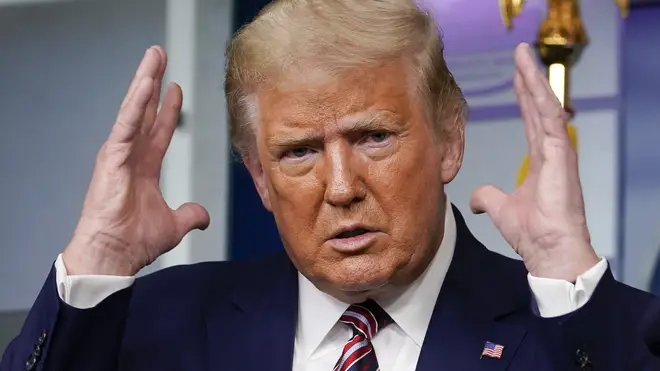
Tom Swarbrick 4pm - 6pm
28 September 2020, 07:54

The New York Times has revealed that he paid just 750 dollars in federal income taxes in 2016, the year he won the presidency.
The bombshell revelation that US President Donald Trump paid just 750 dollars (£578) in federal income tax the year he ran for office threatens to undercut a pillar of his appeal among blue-collar voters.
It could also provide a new opening for his Democratic rival, Joe Biden, on the eve of the first presidential debate.
Mr Trump has worked for decades to build an image of himself as a hugely successful businessman, even choosing “mogul” as his Secret Service code name.
But The New York Times on Sunday revealed that he paid just 750 dollars in federal income taxes in 2016, the year he won the presidency, and in 2017, his first year in office.
He paid no income taxes whatsoever in 10 of the previous 15 years, largely because he reported losing more money than he made, according to the Times, which obtained years worth of tax return data that the president had long fought to keep private.
The development comes at a particularly precarious moment for Mr Trump, whose Republican campaign is struggling to overcome criticism of the president’s handling of the pandemic.
It hands Mr Biden an easy attack line heading into Tuesday’s debate. And with early voting already happening in some states and election day just over a month away, Mr Trump may be running out of time to turn his campaign around.
Mr Trump has repeatedly faced, and survived, devastating turns that would have sunk any other politician.
FAKE NEWS!
— Donald J. Trump (@realDonaldTrump) September 28, 2020
That includes, most notably, the “Access Hollywood” tape released in October 2016, in which Mr Trump was recorded bragging about kissing and groping women without their permission.
The video’s release came just two days before Mr Trump was set to face then-candidate Hillary Clinton in their second debate and was considered a death knell to his campaign at the time.
At this point in the race, with voting already under way in many states and so few voters still undecided, it is unclear whether any new discoveries about Mr Trump would make any difference.
His support over the years has remained remarkably consistent, polls over the course of his presidency have found.
Yet the tax allegations go to the very heart of Mr Trump’s appeal, especially among the blue-collar voters in states like Pennsylvania, Wisconsin and Michigan who propelled him to the presidency in 2016.

Mr Trump was supported by about two-thirds of white voters without college degrees, according to an analysis by the Pew Research Centre, versus only about two in 10 non-white noncollege graduates.
Indeed, in a Gallup poll from February 2016, Republicans who wanted to see Mr Trump win their party’s nomination cited his experience as a businessman as the second-most important reason they backed him, surpassed only by his status as a non-politician and an outsider.
Even today, when asked to explain their support for Mr Trump, voters often point to his success in business as evidence of his acumen.
And they often repeat his talking point that he gave up a great deal to serve as president, citing his sacrifice as evidence that he ran for the job not out of self-interest, but because he cares about improving the lives of people like them.
Roughly half of Americans pay no federal income taxes, but the average income tax paid in 2017 was nearly 12,200, dollars (£9,500) according to the Internal Revenue Service.
Democrats wasted no time in seizing on the news, with the Biden campaign’s online store already selling stickers saying “I paid more income taxes than Donald Trump” on Sunday night.
Senate Democratic leader Chuck Schumer tweeted an emoji calling on followers to raise their hands “if you paid more in federal income tax than President Trump”.
“That’s why he hid his tax returns. Because the whole time, he wasn’t paying taxes. But you were,” added senator Chris Murphy.